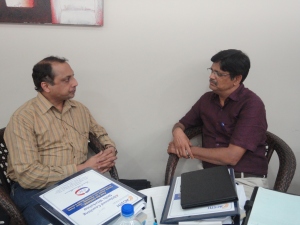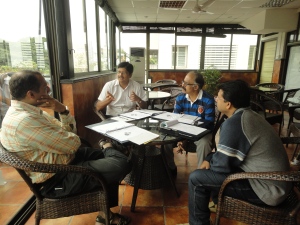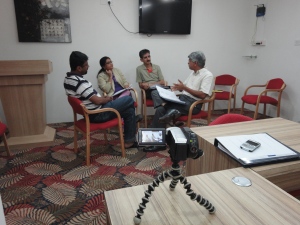Choosing a Coaching Training Institute, Points that needs to be considered before you open your wallet. Part 1
May 8, 2018 Leave a comment
A running commentary of my interaction with a potential coach
Over the past few months, I have had flurry of calls from individuals inquiring what it takes to be a coach and how to become one. After a few minutes of exploratory conversation around the intent, I allow the potential coaches to quiz me around becoming a coach.
The recent caller began by asking me, “What will it cost me to become a credentialed coach?”, I was intrigued by the question, I responded by asking him “Before I tell you the cost, I would like to ascertain that you are aware of what it takes to become a credentialed coach?”, the enthusiast said, “well I was looking at asking you to walk me through, and I began by asking the cost so that I can plan my financials”. I understood the concern and appreciated the need for the individual to plan his investments. At this juncture, I chose to ask the individual, how would you like to begin? The questions flowed.
Caller: Do you think ‘Coaching’ as a practice is good for me bank on?
Sai: Good question. However, could you clarify to me “what exactly are you looking at?”
Caller: I intend to change my career. Was wondering if coaching is well paying and therefore if I could invest my money and efforts to become a coach?
Sai: I hear you tell me 3 things, a change in career, a question if coaching is well paying, & therefore the decision that you want to make if you can invest in learning to become a coach. Would you confirm if I have understood what you are thinking about?
Caller: Yes, you have captured it sequentially. That’ s about it.
Sai: Okay, what do you want to start with?
Caller: Let’ s begin with the career change.
Sai: Great, may I ask you a few questions to begin with, before I get into my long monologue of what it takes to be a coach?
Caller: Sure, go ahead please.
Sai: Tell me, how did you think of coaching as a possible career change?
Caller: I was exploring. Someone told me that I can be a good coach. I work as a teacher and I love to help students. I go out to understand them, before I start to teach them what it takes for them to be successful? My parents and others tell me I am compassionate.
Sai: Thank you for sharing. I notice that you are not only compassionate, I also see you are passionate and enthusiastic about what you do?
Caller: Yes, yes, people tell me. I love what I do, I want to do more for the people that I am in touch with. And here I am talking with you.
Sai: Yes, you are. I hear you tell me that you love what you are doing, and now you are thinking of a career change?
Caller: Yes, I am.
Sai: Tell me more about the career change you are looking at? What’ s the trigger?
Caller: The trigger, I want to help not only students, but also my colleagues, and adults.
Sai: Ok. Help, in what way?
Caller: I am a budhist. I am committed to helping people live life to the fullest and effectively.
Sai: Interesting, your compassion for people is showing up. Tell me more about the use of the word effectively here?
Caller: By effectively, I meant that I want people to be successful in what they do and want to do, in a sense a kind of fulfilment. I hope I am getting across.
Sai: Yes, you are. I understand your passion. If I may say, your passion is to support your compassion of helping people. This in fact is the 1st requirement for a coach. You already have that driver operating for you.
Caller: I see, you are so understanding.
Sai: Tell me, how do you go about understanding what your students, or for that matter, others want?
Caller: I ask them. My parents tell me that I am good listener. I have always wanted to understand others, before I get to download on to them.
Sai: Nice, that’ s wonderful. You meet the second pre-requisite to become a coach.
Caller: Oh, I didn’t know that. So you are saying that being passionate & compassionate to people, & listening to people are pre-requisites.
Sai: Yes, it is.
Caller: What else?
Sai: Tell me, are you ready to run your own enterprise? Ready to attract clients to coach?
Caller: There are already people meeting me and asking me what I think about what they are stuck with or dealing with?
Sai: Nice to know you have people seeking you out. However, it is about making a practice that is paying.
Caller: Yeah, I need to make money to support some of my plans for the future. I have my parents to take care of, may be start a school, get married, run a family. A long way to go.
Sai: All the more reason for you to start looking at it as a business and run it. Which means, are you ready to market and sell, strategize your offerings, be committed to running your business. Remember you asked if it is well paying?
Caller: I will need to learn these.
Sai: Yes, you may have to. So, there are some part of it which you have and there are some parts of it which may have to acquire.
Caller: Yes, yes. I couldn’t agree less with you. You are making me think. I am excited.
Sai: Thank you. Moving ahead, do you love educating people about what you think, you experience, you do?
Caller: I am a teacher, I teach Science and English.
Sai: That is your profession. I am asking you about your drive to educate people around you about what you do?
Caller: They know I am a teacher. I sometimes engage with others on philosophy or preaching’ s from my religious practices.
Sai: Sometimes, not always.
Caller: Yeah, sometimes.
Sai: When you start a business of coaching, it’ s important for you to educate your nearest circle about your journey and allow it to pay it forward.
Caller: I never thought of it that way. Maybe I should.
Sai: From the conversation we have so far, I notice there are many attributes that you possess to become a coach. Coaching is a practice and a business. To be successful you will need not only learn to become a coach, you will also need to learn to attract paying coaching clients. Moreover, the becoming of a coach is a continuous journey.
Caller: I see. Tell me more about learning to become a coach?
Sai: Right, to become a coach the ICF® – International Coach Federation which is committed to advancing the science & art of coaching has enlisted coaching program service providers. These service providers offer programs recognized by ICF®. The approvals accorded are
- ACSTH – Approved Coach Specific Training Hours – these are programs that teach some parts, either in full or part, of Coaching Core Competencies & Ethics by the hours of training.
- ACTP – Accredited Coach Training Program – this is a start to finish program, and the highest level of approval accorded to a program, and the program teaches “ethical guidelines, professional standards, Core competencies, and its application in coaching engagement”. Besides, a graduate receives a minimum of 6 observed written feedback on their coaching behaviour with loads of coaching practice within the training content. Further the program also provides for mandated 10 hours of Mentor Coaching for the graduate. Not only these, the program provider tests your conceptual level understanding and skill prowess before certifying you as a coach.
Caller: Wow, that’ s a whole of things. Tell me what I should particularly remember, before choosing a program.
Sai: Good question. I know for an explorer ACSTH and ACTP could be overwhelming. I would recommend that you consider going over to Https://www.coachfederation.org/ website and reviewed what it takes to becomes a coach. However, I could respond to specific questions in the interest of time.
Caller: I understand. Tell me, how do I know a program is an ACSTH or ACTP? From what you described, ACTP seems to be the best.
Sai: I would recommend that you reviewed the ICF® website and looked up specifically for coach training programs and your preferred location. You will notice a list of ACSTH and ACTP service providers. The ones listed are institutes that meet ICF® periodic audit requirements and have a good standing.
Caller: Sure, I shall do that.
Sai: Right, just in case if this helps, when you go into ICF® website, click on “ICF Credential” followed by “Find Training” – this will lead you to “Training Program Search Service” (TPSS) page. Click on the dialogue box for your choice of certification program, location and language. The system will throw up a list of training service providers programs for you to choose from.
Caller: That’s so nice of you to have explained to me so nicely. In fact, you have been very nice to me.
Sai: Thank you. If it helps you to make decision. Right. So, we looked at what it takes to become a coach. Now, it is time to reiterate that becoming a coach is a journey. It will take you anywhere between 7 months or more to get a hang of coaching, and then it is to attract coaching clients to muster your coaching practice hours before you are ready to apply for ICF® credentials.
Caller: Yes, credentials. What are they?
Sai: ICF® offers 3 levels of credentials. Namely ACC – Associate Certified Coach. This is a practiced coach, who completed a coaching skills program, learning the nuances of coaching and certified to engage with a client 1on1, at best a beginner coach.
Caller: Ok, what are the other 2 levels.
Sai: The other 2 levels are PCC – Professional Certified Coach. This is a proven coach, who has advanced his learning and practice. The person has learned to coach clients at deeper level, is experienced, and has coached more than 25 clients and has over 500 hours of coaching experience. The person has completed 125 or more hours learning.
Caller: Ok
Sai: The final level of credentialing is MCC – Master Certified Coach. This is an expert coach, who has not only advanced his coaching skills but also greatly experienced and possesses mastery over the competence. The coach has coached over 35 clients for over 2500 hours and has undergone 200 hours or more of training.
Caller: That seems a lot. 500 hours seems probable.
Sai: Right. So, to summarize, a. you need to choose a training program that is offered at your location, b. it has to provide you the convenience of spacing your leaning, c. it has to be a program in good standing, meaning continuously audited by ICF® or fulfilling all ICF® expectations, d. the program must offer methodologies to test your conceptual level understanding, & demonstrated skills through internal assessors meeting ICF® established guidelines, e. the fee and choice of payment terms, & f. finally, the trainer and their credentials.
Caller: That’s great. I have a good understanding now. Let me to begin with go over the ICF® website, look up the TPSS, following which I shall revert to you for additional inputs or with a decision to move forward. Thank you so much. You have really nice to me.
Sai: Not at all. If you have found answers to your quest, I am happy.
Caller: Yes, very much, without any doubt.
I have chosen to articulate the entire interaction with a potential coaching student. It is important for students to make the right choice and informed decision. The economic investment to become a coach is huge, the efforts to become and be a coach is humongous. Remember, the training is only teaching you “Learning & Doing Coaching”, from there on it is up to the student / graduate to “Become” and “Be” a coach.
Please share your views, questions, feedback by replying to the blog.
Best wishes, and happy coach learning journey.
To be continued.













